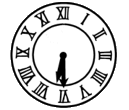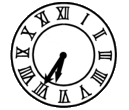The clock
Tips: 1) In English there is no 24-hour-system (sometimes it is used on TV and in timetables). 15.00 is 3 o'clock (p.m.) (on TV: fifteenhundred). That's why you use a.m. (Latin: ante meridiem) and p.m. (post meridiem) in situations where it's necessary to point out that you want to say "in the morning" or "in the evening". In other situations (or when it's clear that school starts in the morning and the party in the evening) it's left out. Example:
2) o'clock (abbreviation: "of the clock") only on the hour 9. Learn the following dialogues by heart: I. A: Look at those clouds. How black they are! There's a thunderstorm coming on. Aren't you afraid? B: Oh no! I like it. Oh/Iook, what a flash of lightning! A: Yes, and there's a clap of thunder. The first thunder this year. B: Shall I turn off the TV? A: What? The thunder is so loud, I can't hear you. B: I say, shall I turn off the TV? Mom says it's better to turn it off during a thunderstorm. A: Yes, do. And I'll shut the window. A gust of wind may break the pane. B: Oh, what a shower! A: It's good. It will lay the dust and revive the flowers in the garden.
II. A. Why don't you go out, Bob? I don't like the way you sit at home and read all day long. B. But there's a hard frost, Mom. A. You haven't been out yet, so how do you know? B. Kate says it's very cold and windy. A. Kate doesn't know. She was out early in the morning, then it was really cold. I've just come in, so I know. It's not so frosty now as it was in the morning, and the wind has dropped. Go for a walk. B. Oh, Mom, I've got such a wonderful book and I am so comfortable here. A. Look how pale you are. An hour or two in the open air will do you good. Just put aside that book, get into your coat and go out like a good boy. B. Oh, all right.
|













